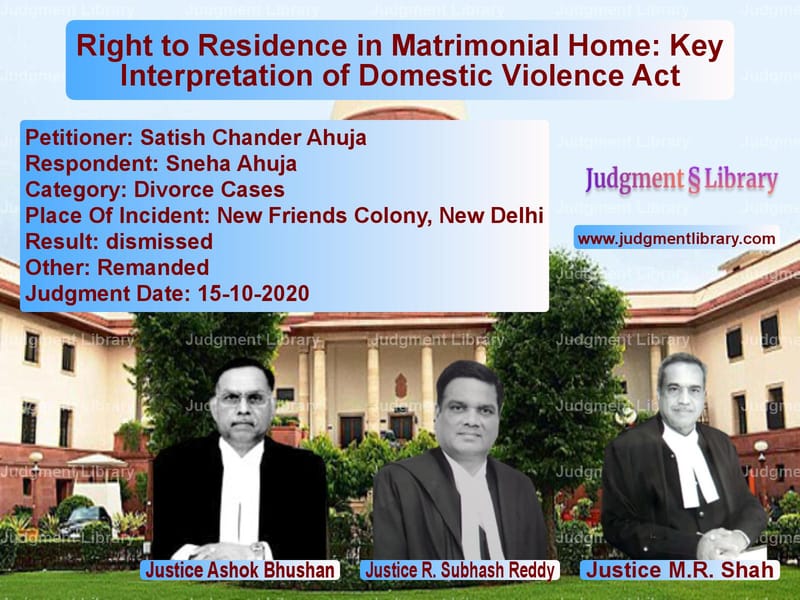Right to Residence in Matrimonial Home: Key Interpretation of Domestic Violence Act
The case of Satish Chander Ahuja vs. Sneha Ahuja revolves around the interpretation of the Protection of Women from Domestic Violence Act, 2005 (hereinafter referred to as the “Act, 2005”). This appeal was filed by Satish Chander Ahuja challenging the Delhi High Court judgment that reversed a decree granted in his favor and remanded the case for fresh adjudication.
The fundamental question was whether a woman has a right to reside in the house owned by her father-in-law, considering it as a shared household under the Domestic Violence Act.
Background of the Case
The appellant, Satish Chander Ahuja, owned property in New Friends Colony, New Delhi. His son, Raveen Ahuja, was married to Sneha Ahuja, the respondent, and the couple resided on the first floor of the property. Due to marital discord, Raveen moved out, and Sneha continued to reside there. After a divorce petition was filed, Sneha Ahuja filed a complaint under the Domestic Violence Act, alleging mental and emotional abuse.
Pleadings of the Parties
Petitioner’s (Appellant) Arguments
The appellant argued that he was the sole owner of the property and that the respondent’s occupation was merely permissive in nature. He contended that the respondent had no legal right to continue residing there since the house was not a shared household within the meaning of Section 2(s) of the Act, 2005.
The appellant relied on the Supreme Court judgment in S.R. Batra vs. Taruna Batra, which held that a shared household must either belong to the husband or be a joint family property.
Respondent’s (Sneha Ahuja) Arguments
The respondent argued that the property was a shared household as defined under the Domestic Violence Act since she had lived there since her marriage. She asserted that she was entitled to protection under Sections 17 and 19 of the Act, which grant women the right to reside in their matrimonial home.
High Court’s Observations
The Delhi High Court set aside the decree of the Trial Court, emphasizing that the determination of whether the property was a shared household required deeper examination. The High Court remanded the case for fresh adjudication, considering the implications of the Domestic Violence Act.
Supreme Court’s Judgment
The Supreme Court addressed multiple key issues:
- Interpretation of “Shared Household” (Section 2(s)): The Court ruled that the definition of a shared household is broader than what was held in S.R. Batra vs. Taruna Batra. It does not require the husband to have ownership or a share in the property.
- Validity of the Decree Under Order XII Rule 6 CPC: The Court held that the Trial Court erred in granting a decree merely on the basis of an admission regarding ownership, without adjudicating the respondent’s claim of residence under the Act, 2005.
- Impact of Pending Domestic Violence Proceedings: The Supreme Court emphasized that the existence of proceedings under the Domestic Violence Act does not preclude a civil suit but acknowledged that such proceedings should be considered in civil cases.
- Right of Residence vs. Ownership: The Court held that the Act, 2005 grants women the right to reside in the shared household, irrespective of ownership. However, this right is not absolute and must be balanced against the rights of other family members.
Key Observations by the Supreme Court
One of the most critical aspects of the judgment was the Court’s rejection of the S.R. Batra vs. Taruna Batra interpretation of shared household. The Court stated:
“The definition of shared household under Section 2(s) cannot be restricted to only joint family properties or properties owned by the husband. The interpretation in S.R. Batra does not lay down the correct law.”
Furthermore, the Court emphasized the importance of balancing the rights of the woman with those of the property owner. It stated:
“A right of residence under the Act, 2005 is not an absolute right and must be harmonized with property rights and other competing interests.”
Conclusion
The Supreme Court upheld the High Court’s decision to remand the matter for fresh adjudication. It affirmed that the respondent had a right to reside in the shared household under the Domestic Violence Act, subject to lawful eviction through appropriate legal procedures.
This judgment is a landmark ruling clarifying the rights of women under the Domestic Violence Act, broadening the definition of a shared household, and providing a nuanced approach to balancing the rights of all parties involved.
Petitioner Name: Satish Chander Ahuja.Respondent Name: Sneha Ahuja.Judgment By: Justice Ashok Bhushan, Justice R. Subhash Reddy, Justice M.R. Shah.Place Of Incident: New Friends Colony, New Delhi.Judgment Date: 15-10-2020.
Don’t miss out on the full details! Download the complete judgment in PDF format below and gain valuable insights instantly!
Download Judgment: Satish Chander Ahuja vs Sneha Ahuja Supreme Court of India Judgment Dated 15-10-2020.pdf
Direct Downlaod Judgment: Direct downlaod this Judgment
See all petitions in Alimony and Maintenance
See all petitions in Child Custody
See all petitions in Domestic Violence
See all petitions in Property Division in Divorce Cases
See all petitions in Judgment by Ashok Bhushan
See all petitions in Judgment by R. Subhash Reddy
See all petitions in Judgment by Mukeshkumar Rasikbhai Shah
See all petitions in dismissed
See all petitions in Remanded
See all petitions in supreme court of India judgments October 2020
See all petitions in 2020 judgments
See all posts in Divorce Cases Category
See all allowed petitions in Divorce Cases Category
See all Dismissed petitions in Divorce Cases Category
See all partially allowed petitions in Divorce Cases Category







